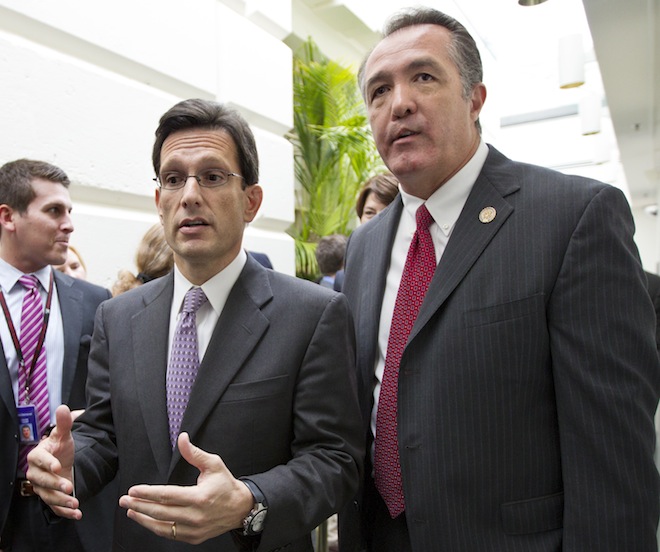Ever since the Supreme Court gutted a centerpiece of the Voting Rights Act and threw it back in Congress’s lap, lawmakers in both parties have engaged in happy talk about the prospects of patching the provision used to proactively snuff out voter discrimination against minorities in the state and local governments where it’s most prevalent.
But it’s looking less and less likely that a fix will be agreed to because Republicans have little to gain and a lot to lose politically if they cooperate.
“Ain’t gonna happen,” Rep. Joe Barton (R-TX) said late last week, according to Roll Call.
A recent House Judiciary Committee hearing made clear that Republicans have little to no interest in reconstituting the Voting Rights Act. Judiciary Chairman Bob Goodlatte (R-TX) opened by emphasizing that even after the Supreme Court’s decision, “other very important provisions of the Voting Rights Act remain in place.”
At issue is the Voting Rights Act’s now-invalid Section 4, the formula used to determine which state and local governments must receive federal pre-approval before changing their voting laws. It was last reauthorized in 2006 by a 98-0 margin in the Senate and 390-33 in the House. But for Republicans, there’s a huge difference between allowing the renewal of a historic law for racial equality, and going out their way to reconstitute it now that the Supreme Court has thrown out part of it.
“Historically I fully understand why they addressed the situations they did,” Rep. Trent Franks (R-AZ), chairman of the Judiciary Constitution and Civil Justice subcommittee, which has jurisdiction over the issue, told reporters. “I am just of the opinion today that we should do as the court said and that is to not focus on punishing the past but on building a better future.”
Attempting to fix the law would require Republicans to give public scrutiny to racial disparity in the party’s geographic base. And it would require backtracking on years of political rhetoric warning of federal government overreach and downplaying racial inequality. On top of that, conservative legal scholars believe the concept of preclearance is unconstitutional.
“There’s no reason for Congress to take any action,” Hans von Spakovsky, a senior legal fellow at the conservative Heritage Foundation, said at the Judiciary hearing.
More specifically, the jurisdictions likely to be included in any new preclearance formula comprise regions of the country that are dominated by conservatives. These are the places where attempts at voter discrimination are most common, and therefore subject to greater scrutiny. Reconstituting Section 4 would mean forcing those mostly Republican-led governments to receive federal preapproval for any changes to voting laws, including major changes like voter ID and minor changes like moving a polling place across the street.
“There’s a tremendous imposition of paperwork and litigation costs on these jurisdictions to making voting changes — even miniscule things like moving a polling place from a park to a school,” said Ilya Shapiro, editor of Cato Institute’s Supreme Court Review.
A more cynical reason is Republicans recognize that without Section 4, their state and local colleagues have greater flexibility to enact laws that make it harder for minority groups like blacks and Hispanics, who disproportionately support Democrats, to vote. Such efforts to expand voter ID laws are already underway in Texas and North Carolina. It also gives states more flexibility to gerrymander maps in a way that alienate minorities.
Sen. Chuck Schumer (D-NY) recognized this fatal problem immediately after the Supreme Court’s ruling, warning that “[a]s long as Republicans have a majority in the House and Democrats don’t have 60 votes in the Senate, there will be no preclearance.”
Rhetoric aside, the Republican lawmakers who actually support a new preclearance formula are few and far between, have little influence within the party, and admit it will be a struggle. GOP leaders have expressed no interest in jumping into the fray.
Most Republicans simply need a plausible pretext to avoid rewriting the Voting Rights Act, and they can subsequently let the effort wither and die. And so far they have two. The first is that the Supreme Court invalidated it. As Rep. Franks argued in a recent House hearing, “[W]e should do as the court said and that is to not focus on punishing the past but on building a better future.” The second is that the Obama administration has ostensibly poisoned the well by last week using another provision of the Voting Rights Act to go after Texas redistricting. As recently as 2011 Texas was found by a court to have sought to marginalize minority voters.
These dynamics go against the rosy rhetoric of some top Republicans.
“My experience with John Lewis in Selma earlier this year was a profound experience that demonstrated the fortitude it took to advance civil rights and ensure equal protection for all,” House Majority Leader Eric Cantor (R-VA) said after the Supreme Court ruling. “I’m hopeful Congress will put politics aside, as we did on that trip, and find a responsible path forward that ensures that the sacred obligation of voting in this country remains protected.”
That seems like wishful thinking at this point.






